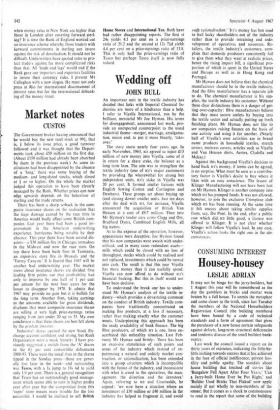Wedding off
JOHN BULL
An important unit in the textile industry has decided that links with Imperial Chemical In- dustries are more of a hindrance than a help.
I refer to Viyella International, run by the brilliant, mercurial Mr Joe Hyman. His terms
for disengagement, announced last week, pro- vide an unexpected counterpoint to the usual industrial theme—merger, marriage, amalgama- tion, union and, to put it more bluntly, 'take-. over.'
The story starts nearly four years ago. In early November, 1963, ict agreed to inject £13 million of new money into Viyella, some of it in return for a share stake, the balance as a long term loan. The aim was to strengthen the textile industry (one of ices major customers) by providing the wherewithal for strong but independent units. ices stake in Viyella was 20 per cent. It formed similar liaisons with English Sewing Cotton and Carrington and Dewhurst. These groups set about buying up (and closing down) smaller units. Just ten days after the deal with Kt, for instance, Viyella announced the acquisition of British Van Heusen at a cost of £9.7 million. Then into Mr Hyman's tender care came Clegg and Orr, Bradford Dyers, Combined English Mills, all big names.
As to the expense of the operation, however, appearances were deceptive. Joe Hyman found that his new companies were awash with under- utilised, and in many cases redundant assets— mills which could be closed with no loss of throughput, stocks which could be realised and not replaced, investments which could be turned into cash. The result is that this year Viyella has more money than it can usefully spend. Viyella can now afford to do without ices financial backing. But this in itself would not have been decisive.
To understand the break one has to under- stand Mr Hyman's analysis of the textile in- dustry—which provides a devastating comment on the conduct of British industry. Textile com- panies have traditionally concentrated on making fine products, at a loss if necessary, rather than making exactly what the customer wants. Underpinning this approach has been the ready availability of bank finance. The big fibre producers, of which to is one, have acerbated this unhealthy situation. Last Feb- ruary Mr Hyman said firmly: 'there has been an excessive stimulation of such points and areas of the industry which instead of ex- periencing a natural and orderly market con- traction, or rationalisation, has been extended into a group structure which is incompatible with the future of the industry, and inconsistent with what is owed to the operatives, the man- agement, the direction and the _investors.' Again, referring to to and Courtaulds, he argued: 'we now have a situation where an investment of £30 million or £40 million in the industry has helped to fragment it, and avoid such rationalisation.' Ices money has ben used to bail lucky shareholders out of the industry rather than to provide retraining and rede- velopment of operatives and resources. Re- tailers, the textile industry's customers, com- plain that domestic producers consistently fail to give them what they want at realistic prices, hence the rising import bill, a significant pro- portion of which is spent in the United States and Europe as well as in Hong Kong and Portugal.
Mr Hyman does not believe that the chemical manufacturer should be in the textile industry. And the fibre manufacturer has a separate job to do. The chemical manufacturer is his sup- plier, the textile industry his customer. Without these clear distinctions there is a danger of get- ting over-capacity: fibre manufacturers believe that they must secure outlets by buying into the textile sector and actually putting up fresh finishing plant. Mr Hyman does not like to see companies raising finance on the basis of one activity and using it for another. (Nearly half of Viyella's own activities are in brand name products in household textiles, stretch covers, mattress covers, articles such as Viyella and Van Heusen shirts, Aertex, Clydella and Mekay.)
Against this background Viyella's decision to hand back Ices money, if terms can be agreed, is no surprise. What must be seen as a contribu- tory factor is Viyella's desire to buy where it likes with an easy conscience. The lesson of Klinger Manufacturing will not have been lost on Mr Hyman. Klinger is another company into which to has pumped funds. It was not allowed, however, to join the exclusive Crimplene club which tct has been running. At the same time it felt uneasy about taking similar supplies from, say, Du Pont. In the end, after a public row which did..icr little good, a licence was offered to Klinger. It is not clear whether Klinger will follow Viyella's lead. In any case, Viyella's action looks the right one in the cir- cumstances.






























 Previous page
Previous page